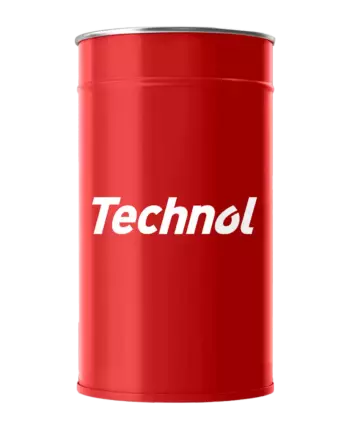Heat Transfer Oil
Heat Transfer Oils – Efficient Energy Transmission and Long-Term Protection in Industrial Systems
The Role of Heat Transfer Oils in Industry
Heat transfer oils are used to ensure efficient and safe transfer of thermal energy in industrial processes. They are particularly applied in:
-
industrial heating systems,
-
heat exchangers,
-
coating and painting equipment,
-
chemical and petrochemical industries,
-
power generation plants.
They play a crucial role in continuous heat transfer and equipment protection.
Key Advantages:
-
High thermal resistance → long-term stability,
-
Low volatility → minimized energy loss,
-
Protective properties → extended equipment life.
Types of Heat Transfer Oils
2.1. Mineral-Based Heat Transfer Oils
-
Traditional and cost-effective option.
-
Good thermal conductivity.
-
Drawback: less resistant to oxidation and thermal aging compared to synthetic oils.
2.2. Synthetic Heat Transfer Oils
-
Provide high thermal stability and oxidation resistance.
-
Operate reliably across a wider temperature range.
-
Reduce operational costs due to longer oil change intervals.
-
Considered the most reliable choice for heavy-duty industrial processes.
Technical Characteristics of Heat Transfer Oils
-
High thermal stability – perform under high temperatures without decomposition.
-
Low volatility – reduced energy loss and oil consumption.
-
Oxidation resistance – prevention of deposits and sludge formation.
-
Chemical stability – consistent performance during long-term use.
-
Efficient heat transfer – enabling continuous and effective processes.
Industrial Applications and Use Cases
Heat transfer oils are widely used in:
-
industrial heaters and heat exchangers,
-
coating and painting equipment,
-
chemical and petrochemical industries,
-
food industry (special food-grade heat transfer oils),
-
energy and power generation facilities.
The correct oil choice increases energy efficiency and guarantees long-lasting equipment operation.
Advantages of Technol Heat Transfer Oils
Technol heat transfer oils are developed specifically for Azerbaijan’s industrial and climatic conditions. Their main advantages include:
-
Tailored formulations for local climate and industry needs,
-
Long service life and high stability,
-
Excellent protection against oxidation and coking,
-
Performance that optimizes energy consumption,
-
Compliance with international standards (ISO, DIN, ASTM).
Operation and Maintenance of Heat Transfer Oils
To extend oil life and protect equipment:
-
Perform regular oil analysis,
-
Follow oil change intervals,
-
Keep equipment clean,
-
Use only manufacturer-recommended viscosity and formulations.
Heat transfer oils are essential solutions for efficient energy transfer and long-term protection of industrial systems.
In Azerbaijan, Technol heat transfer oils are a trusted partner for industrial enterprises, providing:
-
high quality,
-
long-term stability,
-
and energy-saving performance.
With Technol heat transfer oils, you can ensure durable and efficient industrial equipment.
Showing the single result
Heat Transfer Oils – Efficient Energy Transmission and Long-Term Protection in Industrial Systems
The Role of Heat Transfer Oils in Industry
Heat transfer oils are used to ensure efficient and safe transfer of thermal energy in industrial processes. They are particularly applied in:
-
industrial heating systems,
-
heat exchangers,
-
coating and painting equipment,
-
chemical and petrochemical industries,
-
power generation plants.
They play a crucial role in continuous heat transfer and equipment protection.
Key Advantages:
-
High thermal resistance → long-term stability,
-
Low volatility → minimized energy loss,
-
Protective properties → extended equipment life.
Types of Heat Transfer Oils
2.1. Mineral-Based Heat Transfer Oils
-
Traditional and cost-effective option.
-
Good thermal conductivity.
-
Drawback: less resistant to oxidation and thermal aging compared to synthetic oils.
2.2. Synthetic Heat Transfer Oils
-
Provide high thermal stability and oxidation resistance.
-
Operate reliably across a wider temperature range.
-
Reduce operational costs due to longer oil change intervals.
-
Considered the most reliable choice for heavy-duty industrial processes.
Technical Characteristics of Heat Transfer Oils
-
High thermal stability – perform under high temperatures without decomposition.
-
Low volatility – reduced energy loss and oil consumption.
-
Oxidation resistance – prevention of deposits and sludge formation.
-
Chemical stability – consistent performance during long-term use.
-
Efficient heat transfer – enabling continuous and effective processes.
Industrial Applications and Use Cases
Heat transfer oils are widely used in:
-
industrial heaters and heat exchangers,
-
coating and painting equipment,
-
chemical and petrochemical industries,
-
food industry (special food-grade heat transfer oils),
-
energy and power generation facilities.
The correct oil choice increases energy efficiency and guarantees long-lasting equipment operation.
Advantages of Technol Heat Transfer Oils
Technol heat transfer oils are developed specifically for Azerbaijan’s industrial and climatic conditions. Their main advantages include:
-
Tailored formulations for local climate and industry needs,
-
Long service life and high stability,
-
Excellent protection against oxidation and coking,
-
Performance that optimizes energy consumption,
-
Compliance with international standards (ISO, DIN, ASTM).
Operation and Maintenance of Heat Transfer Oils
To extend oil life and protect equipment:
-
Perform regular oil analysis,
-
Follow oil change intervals,
-
Keep equipment clean,
-
Use only manufacturer-recommended viscosity and formulations.
Heat transfer oils are essential solutions for efficient energy transfer and long-term protection of industrial systems.
In Azerbaijan, Technol heat transfer oils are a trusted partner for industrial enterprises, providing:
-
high quality,
-
long-term stability,
-
and energy-saving performance.
With Technol heat transfer oils, you can ensure durable and efficient industrial equipment.
What is industrial oil?
Industrial oils are special fluids used in various industrial sectors that ensure the proper operation of machines and equipment, reduce friction, protect against corrosion, and balance heat. These oils are essential for both heavy industry and production equipment.
Why is industrial oil important?
-
Ensures the longevity of equipment
-
Minimizes energy consumption by reducing friction
-
Prevents overheating and wear
-
Reduces technical problems and maintenance costs
-
Increases system stability and performance
What are the main types of industrial oils?
Industrial oils are classified based on their functions and areas of use as follows:
Hydraulic Oils
Application: Presses, CNC machines, forklifts, industrial robots
Function: Transmission of pressure and maintaining stability in hydraulic systems
Compressor Oils
Application: Air compressors, refrigeration systems
Function: Lubrication and cooling of compressors
Gear Oils
Application: Industrial gearboxes, mechanical transmissions
Function: Lubrication of gears, reduction of friction and heat
Product suggestion: Technol Gear Oil EP 90
Turbine Oils
Application: Power plants, steam and gas turbines
Function: Heat transfer and pressure balancing
Heat Transfer Oils
Application: Heating systems, process ovens
Function: Heat transfer at high temperatures
Product suggestion: Technol AZURIT 32
Usage Guidelines for Industrial Oils
-
Correct type selection: Use the type specified in the technical documentation of the equipment
-
Clean systems only: Clean the system of contaminants before adding oil
-
Proper dosage: Excessive oil can lead to operational issues
-
Timely replacement: Expired oils can damage the system
Storage Conditions
-
Store in a dry and cool place (ideally between +5°C and +25°C)
-
Protect from direct sunlight
-
Containers must be tightly sealed
-
Keep away from moisture and dust
Industries suitable for industrial oil use:
-
Construction machinery (excavators, bulldozers)
-
Factory and plant equipment
-
Automatic transmissions and robots
-
Heating and power stations
Boost performance with Technol industrial oils!
Technol industrial oils are produced in accordance with international standards. The products are ISO, DIN, and API certified and are suitable for both heavy and light industrial equipment.



